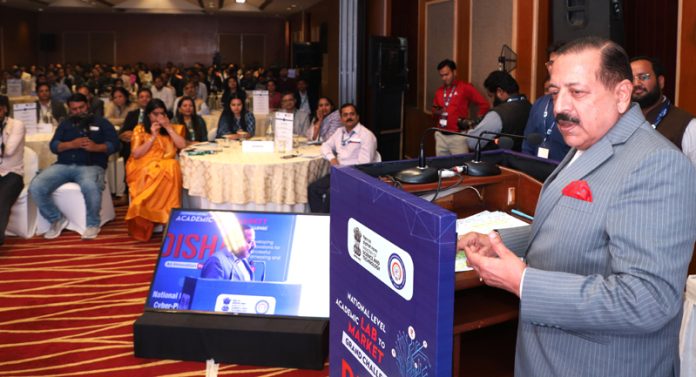
Excelsior Correspondent
NEW DELHI, Mar 3 : “India R&D spending (GERD) is double in last one decade during the government headed by Prime Minister Narendra Modi, from Rs 60,196 cr in 2013-14 to Rs 1,27,381 cr and is redefining the future economy of India which will be defined by homegrown innovations in artificial intelligence, biotechnology, and quantum computing,” Dr. Jitendra Singh said, underscoring the role of Government-backed initiatives in catalysing scientific advancements.
Speaking at the DISHA event at India Habitat Centre here, the Union Minister of State (Independent Charge) for Science and Technology; Earth Sciences and Minister of State for PMO, Department of Atomic Energy, Department of Space, Personnel, Public Grievances and Pensions highlighted the Government’s multi-pronged strategy to position India as a global leader in deep-tech innovation and commercialization.
Dr. Jitendra Singh reiterated that India is making significant strides in fostering an intellectual property (IP)-driven innovation ecosystem, with academia, industry, and startups playing a pivotal role. He noted that the Government’s emphasis on research and development (R&D) funding has led to India’s Gross Expenditure on Research and Development (GERD) more than doubling in the last decade, from Rs 60,196 cr in 2013-14 to Rs 1,27,381 cr. “The Government is not only investing in research but also ensuring that these innovations are seamlessly transitioned from labs to industries, strengthening the foundation of Atmanirbhar Bharat,” he added.
The DISHA Program, an initiative aimed at Developing Innovations, Successful Harnessing, and Adoption, is a step towards building a knowledge-based economy where research-driven solutions transform industries. The program is designed to support faculty members and students working on disruptive technologies across disciplines, ensuring that India remains at the forefront of global innovation.
Dr. Jitendra Singh emphasized that initiatives like DISHA align with the Anusandhan National Research Foundation (ANRF), which seeks to create a unified research ecosystem bridging science, humanities, and social sciences. This integrated approach will empower Indian researchers to engage in cross-sectoral collaborations, pushing the boundaries of discovery and implementation.
One of the key highlights of Dr. Jitendra Singh’s address was India’s policy shift in allowing private sector participation in strategic fields such as space technology and nuclear research. “What was once solely the domain of Government institutions is now open to private enterprises, enabling faster technological advancements, higher efficiency, and global competitiveness,” he stated.
Highlighting the transformative impact of artificial intelligence in healthcare, Dr. Jitendra Singh pointed out the success of AI-driven mobile telemedicine units in providing healthcare access to remote areas. “AI-powered diagnostics and telemedicine solutions are already redefining patient care, making high-quality healthcare services accessible and affordable for all,” he noted.
However, he stressed the importance of maintaining a balance between AI and human expertise. “The role of AI is to complement human intelligence, not replace it. A hybrid approach will ensure that technology enhances, rather than diminishes, the role of skilled professionals in healthcare and other critical fields,” he added.

